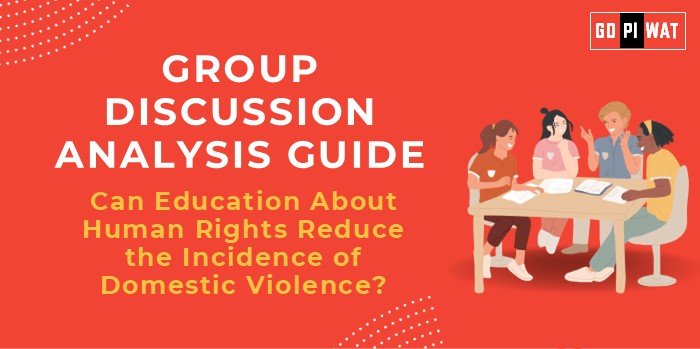📋 GROUP DISCUSSION (GD) ANALYSIS GUIDE
Can Education About Human Rights Reduce the Incidence of Domestic Violence?
🌐 Introduction to the Topic
Opening Context: “Domestic violence remains a pervasive global issue, with millions affected annually. Education about human rights is increasingly viewed as a transformative approach to addressing and preventing this societal challenge.”
Topic Background: Human rights education focuses on raising awareness about equality, dignity, and legal protections. Domestic violence, deeply rooted in societal norms and gender biases, could potentially be mitigated by empowering individuals with this knowledge.
📊 Quick Facts and Key Statistics
- Global Prevalence: 1 in 3 women experience domestic violence globally (WHO, 2023).
- India-Specific Data: National Family Health Survey (NFHS-5) reported 29.3% of Indian women aged 18–49 faced domestic violence.
- Impact of Awareness Programs: UN Women reports a 20% reduction in domestic violence in communities exposed to sustained human rights education.
- Youth Focus: 85% of young participants in human rights education programs exhibit improved attitudes toward gender equality (UNESCO, 2022).
👥 Stakeholders and Their Roles
- Government: Policy implementation, funding for educational programs, and enforcing laws.
- NGOs: Conducting workshops, grassroots campaigns, and advocacy.
- Schools and Universities: Integrating human rights education into curricula.
- Media: Promoting awareness through campaigns and highlighting success stories.
🏆 Achievements and Challenges
Achievements:
- Behavioral Change: In rural Rajasthan, human rights workshops led to a 15% decline in domestic abuse cases (local NGO study).
- Legal Empowerment: Increased reporting of cases due to awareness of rights.
- Global Success: Nordic countries, with comprehensive education on human rights, report some of the lowest domestic violence rates worldwide.
Challenges:
- Societal Resistance: Deeply ingrained patriarchal norms hinder change.
- Limited Reach: Programs often fail to penetrate rural or marginalized areas.
- Lack of Infrastructure: Insufficient trained educators and resources.
🔗 Structured Arguments for Discussion
- Supporting Stance: “Education about human rights equips individuals with the knowledge to challenge abusive behaviors, contributing to a decline in domestic violence rates.”
- Opposing Stance: “While education helps, it cannot single-handedly overcome systemic issues like poverty, lack of legal enforcement, or ingrained cultural norms.”
- Balanced Perspective: “Human rights education is a crucial first step but must be paired with legal reforms, economic empowerment, and societal engagement for lasting change.”
💬 Effective Discussion Approaches
- Opening Approaches:
- Start with statistics to highlight the severity of the issue.
- Use a real-world case study to illustrate the impact of education.
- Counter-Argument Handling: “While systemic issues persist, education creates a foundational shift in societal attitudes, laying the groundwork for further interventions.”
📈 Strategic Analysis of Strengths and Weaknesses
- Strengths: Proven behavioral impact, empowerment of victims.
- Weaknesses: Limited rural penetration, dependence on infrastructure.
- Opportunities: Partnerships with global organizations, tech-enabled education.
- Threats: Cultural pushback, lack of sustained funding.
🌟 Connecting with B-School Applications
- Real-World Applications:
- Management Perspective: Designing scalable education programs.
- CSR Projects: Partnering with NGOs to promote awareness.
- Sample Interview Questions:
- “How would you design a human rights awareness campaign to combat domestic violence?”
- “Evaluate the role of education in changing societal norms.”
- Insights for Students: Link this topic to diversity and inclusion projects or societal impact initiatives.


